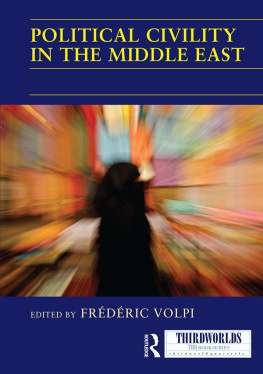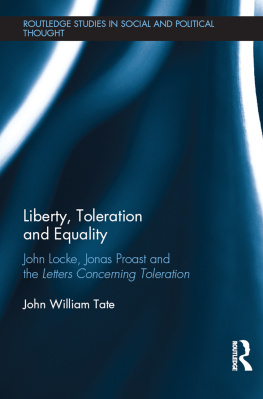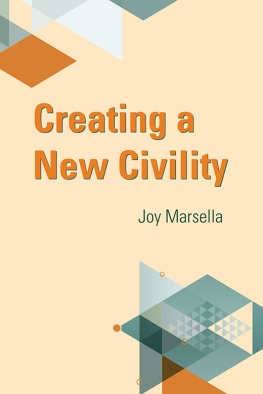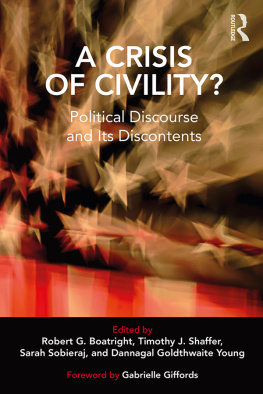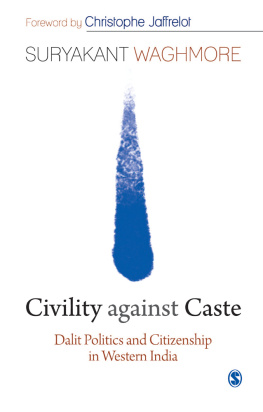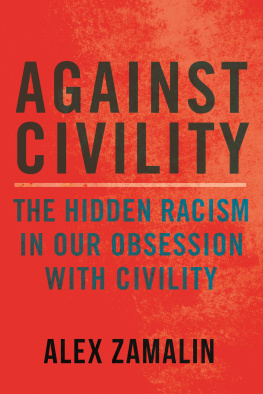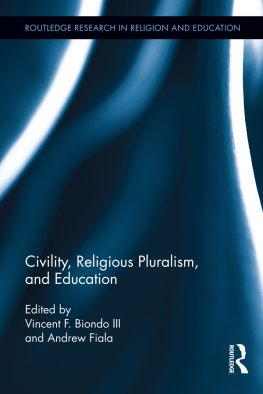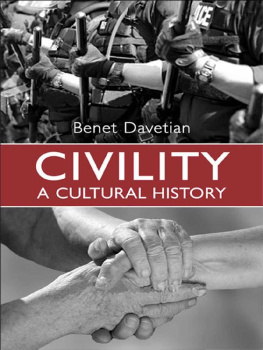Mere Civility
MERE CIVILITY
Disagreement and the Limits of Toleration
TERESA M. BEJAN

Harvard University Press
CAMBRIDGE, MASSACHUSETTS
LONDON, ENGLAND
2017
Copyright 2017 by the President and Fellows of Harvard College
All rights reserved
First printing
ISBN 978-0-674-97274-2 (EPUB)
Cover design: Graciela Galup
Cover art: Hernan Pardo / Thinkstock
The Library of Congress has catalogued the print edition of this book as follows:
Names: Bejan, Teresa M., 1984 author.
Title: Mere civility : disagreement and the limits of toleration / Teresa M. Bejan.
Description: Cambridge, Massachusetts : Harvard University Press, 2017. | Based on the authors thesis (Ph. D.Yale University, 2013). | Includes bibliographical references and index.
Identifiers: LCCN 2016021054 | ISBN 9780674545496
Subjects: LCSH: CourtesyPolitical aspects. | TolerationPolitical aspects. | DiscussionPolitical aspects. | Freedom of speech. | Forums (Discussion and debate)History.
Classification: LCC BJ1533.C9 B45 2017 | DDC 177/.1dc23
LC record available at https://lccn.loc.gov/2016021054
For my parents
CONTENTS
The major works of Roger Williams, Thomas Hobbes, and John Locke are cited frequently in the following chapters. Full bibliographical details can be found in the references, but the following abbreviations will be used for citations in the text, followed by page number, (except where otherwise noted).
Williams
| Key | Roger Williams, A Key into the Language of America (1643) in Vol. 1 of The Complete Writings of Roger Williams, ed. Perry Miller. New York: Russell & Russell, 1963. |
| BT | Roger Williams, The Bloudy Tenent of Persecution for Cause of Conscience (1644) in Vol. 3 of The Complete Writings of Roger Williams. New York: Russell & Russell, 1963. |
| YMB | Roger Williams, The Bloody Tenent Yet More Bloody (1652) in Vol. 4 of The Complete Writings of Roger Williams. New York: Russell & Russell, 1963. |
| GF | Roger Williams, George Fox Diggd Out His Burrowes (1676) in Vol. 5 of The Complete Writings of Roger Williams. New York: Russell & Russell, 1963. |
Hobbes
| EL | Thomas Hobbes, The Elements of Law, Natural and Politic (1640), ed. J. C. A. Gaskin. Oxford: Oxford University Press, 2008. |
| DC | Thomas Hobbes, De Cive (1642), ed. Richard Tuck and trans. Michael Silverthorne. Cambridge, UK: Cambridge University Press, 1998. |
| L | Thomas Hobbes, Leviathan (1651), ed. Noel Malcolm. Oxford,UK: Oxford University Press, 2012. Parenthetical citations include the volume, chapter, and page numbers. |
| B | Thomas Hobbes, Behemoth, or the Long Parliament (1681), ed. S.Holmes. Chicago: University of Chicago Press, 1990. |
Locke
| FT and ST | John Locke, First Tract of Government (1660) and Second Tract of Government (c. 1662) in Locke: Political Essays, ed. M.Goldie. Cambridge, UK: Cambridge University Press, 1990. |
| LCT and ECT | John Locke, A Letter Concerning Toleration (1689) and An Essay Concerning Toleration (1667) in A Letter Concerning Toleration and Other Writings, ed. M. Goldie. Indianapolis, IN: Liberty Fund, 2010. |
| SL and TL | John Locke, A Second Letter Concerning Toleration (1690) and A Third Letter for Toleration (1692) in vol. 5 of The Works of John Locke. London: Rivington, 1824. |
| STCE | John Locke, Some Thoughts Concerning Education (1693) in Some Thoughts Concerning Education and Of the Conduct of the Understanding, ed. R. Grant and N. Tarcov. Indianapolis: Hackett, 1996. |
People who expect deference resent mere civility.
MASON COOLEY, City Aphorisms (1990)
Empowered by faith, consistently, prayerfully, we need to find our way back to civility. That begins with stepping out of our comfort zones in an effort to bridge divisions... stretching out of our dogmas, our prescribed roles along the political spectrum.... Civility also requires relearning how to disagree without being disagreeable.
BARACK OBAMA, Remarks at the National Prayer Breakfast (2010)
TODAY, POLITICIANS AND PUBLIC INTELLECTUALS across the political spectrum warn that we face a crisis of civility, a veritable war of words that distorts our public discourse, threatens our democracy, and penetrates the deepest reaches of our private lives. Controversies over whether universities should tolerate the uncivil speech of students or professors appear as only the latest outbreak in an epidemic, the inflammatory effects of which can be felt from the halls of the Ivory Tower to the partisan swamps of Washington, in the nations pulpits and its neighborhood streets, and in the scorched earth exchanges passing for debate in the media and online, above all. The rich metaphorical language used to describe our predicament conveys a danger deeper than poor manners. Words wound, rhetorical heat fans the flames, and vitriol corrodes the affective bonds between citizens. Incivility infects the body politic as a source of creeping social discord and decay. When wars of words rage unchecked, it suggests, can wars of swords be far behind?
Whereas a decade ago, talk of a civility crisis focused on the decline of civic solidarity and social capital,
Wars of words, it seems, are catching. On the surface, eliminationist political rhetoric, religious insult, and hate speech may seem to have little in common; however, these species of incivility are closely connected. As forms of verbal violence, These questions of believing and belonging go straight to the heart of how we see the worldand each other. Whether in politics, religion, or the ideological and identitarian hothouses of academia, the fears underlying declarations of a crisis of civility are the same: that even when they do not bring us to blows, our uncivil disagreements will exacerbate our fundamental differences and push us farther and farther apart.
This fear is not without foundation. Since the 1970s, ideology and partisan identity have outstripped race as the lines along which Americans divide themselves, both socially and geographically. The retreat of academics into like-minded disciplines and of students on campus into activist enclaves reflects a similar trend of ideological sorting and polarization on the micro level.
This civility-skepticism is healthy, but it also misses the point. It doesnt really matter whether incivility is, in fact, on the rise, because the crisis of civility is identical with the growing perception that there is such a crisis and that something must be done. But what? The solution seized upon by political practitioners and theorists alike has been more civility. In societies committed to free expression, this consummately liberal virtue would seem the only plausible restraintand a largely uncontroversial one. Not only did Obamas predecessor, George W. Bush, make the need for civility a central theme of his first inaugural address,
Endorsed by so many, in such different places and times, one might be forgiven again for thinking the current crisis much ado about very little. Calls for civility can often sound more like whining about the ordinary dirtiness of politics, while accusations of incivility have proven to be an effective, if cynical, strategy for scoring points against ones political opponents.


